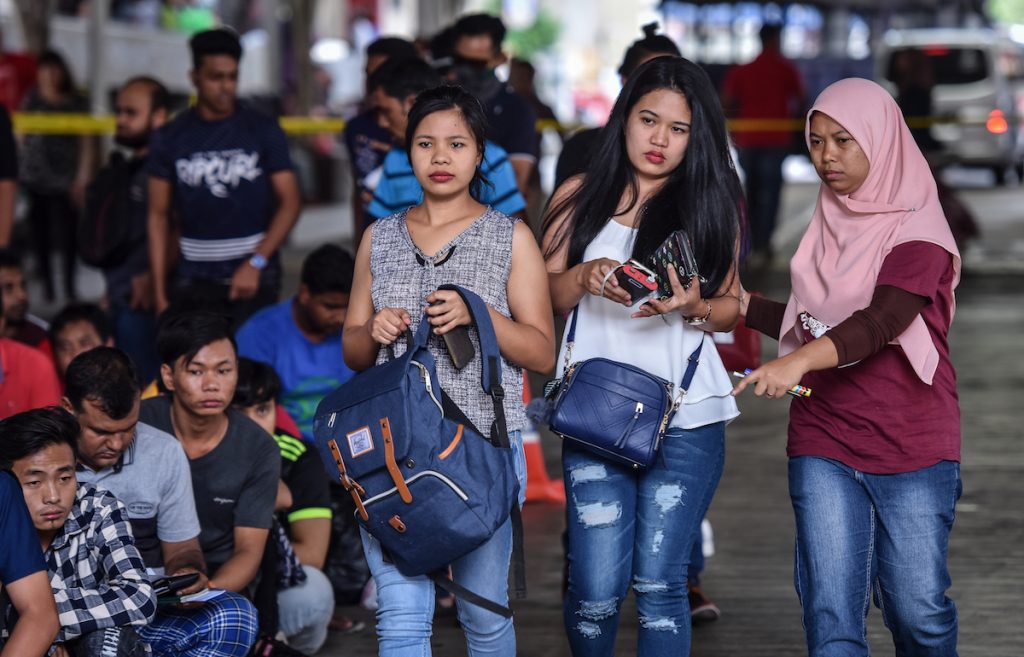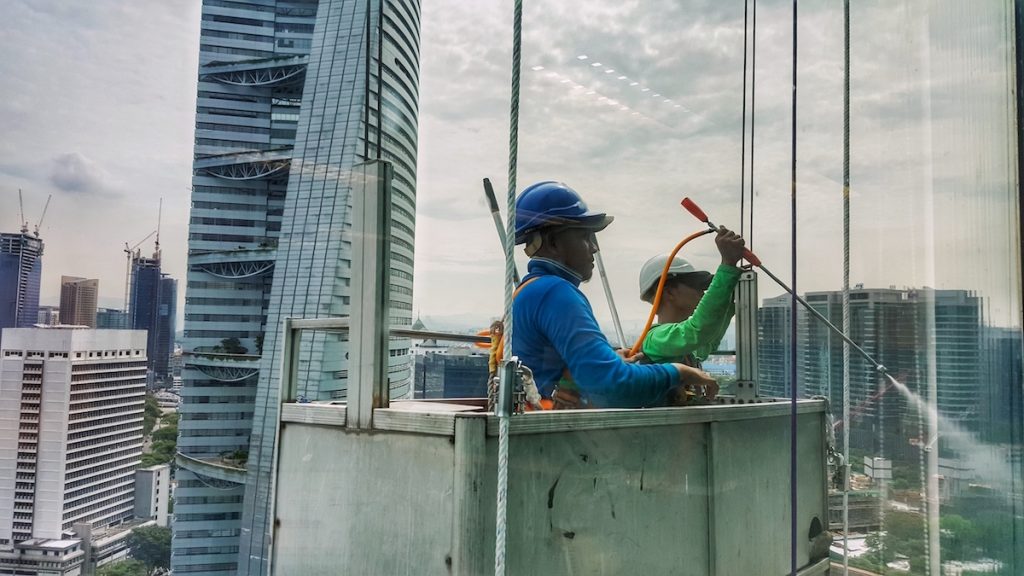When the Malaysian authorities began rounding up migrant workers at the start of May this year few people would have been able to predict the impact this initial move would have on the nation’s economy, its people and indeed long-term employment policy.
Malaysia has historically been a cultural destination — attracting peoples from an array of nations to exploit its location and natural resources over hundreds of years — but in the modern context the need for migrant labor exploded from the 1970s onwards.
The economy boomed and with it the standard of living. Malaysians quickly lost their appetite for the arduous, backbreaking, low-paid jobs their forebears had done to keep the nation ticking over.
So, for the past 40 years or so, Malaysia has imported a steady stream of labor from countries nearby: Indonesia, Myanmar, India, the Philippines and Bangladesh providing the lion’s share of what is now estimated to be a workforce close to 4 million strong.
However, the May raids on areas in downtown Kuala Lumpur, where thousands of migrant workers were herded into trucks and sent to immigration detention centers for summary deportation, kickstarted a chain of events that have set Malaysia on a perilous course.
The nation was already in a state of lockdown, with movement restricted to essential travel for groceries in the locality only, as the reality of the COVID-19 pandemic began to bite.
Despite a gradual easing of restrictions and a systematic return-to-work policy, the impact of the coronavirus has since had a crippling effect on domestic employment.
Conservative estimates predict that, as more and more businesses fold, more than 2 million Malaysians will be out of work by year’s end. That’s 15 percent of the nation’s workforce or five times its average stated unemployment figure.
While refuting what it believes to be alarmist figures (that came from its own Department of Statistics), the government knows that contending with millions of unemployed citizens as the nation lives off the backs of foreigners is not a pleasant situation to manage.

Hence, in a move championed by Defense Minister Ismail Sabri Yaakob, the government has placed a moratorium on importing migrant labor at least until the end of 2020, thus giving Malaysians the chance to fill the vacancies left behind by foreigners as they leave or are sent home.
Theoretically, problem solved, but Malaysia is a country where practicality is far removed from theory.
From an employer’s perspective, the prospect of ditching their foreign workforce for Malaysians will leave many turning white and steadying themselves on the furniture.
For a start, Malaysians are protected by employment law and a legal minimum wage, while migrant workers are not.
This has created a grey area of the economy rife with exploitation.
Employers routinely take advantage of a swathe of workers who are desperately poor and will do virtually anything to ensure receipt of a steady paycheque they can wire home to family.
It is common practice to withhold a worker’s passport upon arrival — ostensibly to ensure he or she does not abscond — effectively trapping the worker on-site, while wages are docked or forfeited for breaking any one of a multitude of rules known or unknown.
Typically, foreign workers will earn US$140-US$190 a month — US$200 if they’re lucky — much less than the US$286 a month minimum wage guaranteed for Malaysians.
Meanwhile, migrant workers are expected to work long, backbreaking hours six or seven days a week in hot and often dangerous conditions. Work related deaths are frequently reported in the media.
This is just for legally employed migrant workers.
The remaining 1 million or so people are in a far worse situation, some living a life more akin to slavery.

It is difficult to give accurate figures on this aspect of the economy because the government looks the other way, while no independent organization is equipped to cover it in terms of sheer scale.
The distinction to make here is that some of these workers are indeed the miscreants the government harps on about as the root of all evil. They slip across the border and take full advantage of the black economy.
Yet, the overwhelming majority of migrant workers are brought in quite legally to work in, for example, a relatively cushy construction job, only to find themselves whisked away from the airport by their unscrupulous employment agent to, say, a remote farm or plantation, where they will be locked in a shipping container or shack and expected to till the fields until they can find some way out of their dire circumstances.
So, when it comes to hiring Malaysians, the key problems are immediately apparent — much higher wages, fewer working hours and much better working conditions. This, of course, excludes the fact that foreigners are an endless supply of supplicant labor.
The bump in wages alone would mean employers can expect to take a conservative US$1 billion hit to their collective annual revenues.
Meanwhile, finding the domestic workforce could prove more problematic than for pure economic reasons.
Decades of importing foreign workers has created a local mindset generally averse to these dirty jobs, even among the economically disadvantaged Malays.
A divisive racial policy introduced in 1970 has also had a hand in cementing this snobbery for unskilled labor.
Malays have traditionally been able to benefit from a strong chance of employment in a hugely bloated civil service or one of hundreds of government-linked companies.
At the very least, they can collect a slew of government handouts every month to ensure survival.

The latter being very much a case in point. When the government first rounded up migrant workers, wet markets were the first businesses to feel the pinch as their much-needed laborers literally vanished overnight.
Then, ministers began lauding Malays stepping forward and taking on these jobs as evidence that Malaysia would not in fact suffer an employment crisis, moreover that Malays were not afraid of a hard day’s work.
However, checks by the local press all but put paid to these claims as market stall owners said that most of their new workers had quit within days, upset at the long hours, the toil and the realization that taking handouts was a much easier existence than 12 hours’ arduous sweat every day.
While this may be but a small straw poll of the current situation, the nascent reality is the widening chasm between the public and the government’s relative expectations when it comes to employment.
Added to which, allowing hundreds of thousands of migrant workers to return from, for example, Indonesia or India, where COVID-19 is running rampant, could precipitate a health crisis that would all but obliterate the economy.
The government cannot realistically expect a nation weaned on decades of cash handouts to suddenly want to take on low-paid jobs, so it is clear that Ismail Sabri’s policy has proven to be rather rash.
In days of old, he could U-turn like a lost pensioner in a supermarket if a policy wasn’t working out.
However, faced with economic crisis in whichever way he looks, the minister has now jammed himself firmly between a rock and a hard place.
Neither of which are of any benefit to Malaysians or the country as a whole.
Gareth Corsi is a freelance journalist based in Malaysia. The views expressed in this article are the opinions of the author and do not necessarily reflect the editorial stance of LiCAS.news.






